Bold new outreach schemes inspiring a generation of future scientists
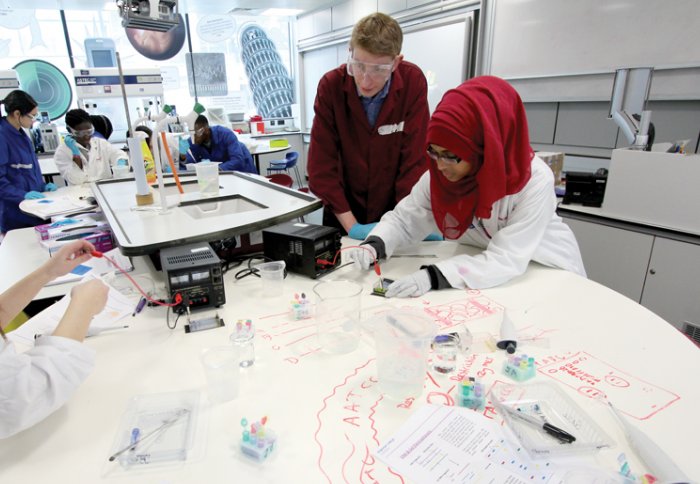
We take an in-depth look at outreach schemes that aim to forge lasting links between Imperial researchers and schools around London.
A serious crime has been committed. Swabs have been taken from the scene and scientists are now busy cross referencing the DNA profile against those of five potential suspects.
It could be a description of a police forensics lab or the start of a CSI episode, but this is in fact a mock experiment being carried out by sixth form pupils at the WOHL Reach Out Lab on the South Kensington Campus.
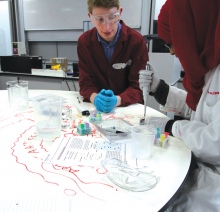 The scenario might be fictional but the methodology and DNA are very much real. The activity is part of the Imperial STEM Enrichment Programme (ISEP), launched in 2011 and run in partnership with outreach specialists Exscitec.
The scenario might be fictional but the methodology and DNA are very much real. The activity is part of the Imperial STEM Enrichment Programme (ISEP), launched in 2011 and run in partnership with outreach specialists Exscitec.
It encourages high achieving students from under-represented groups to apply to the College and other leading universities. The scheme involves Imperial staff and student volunteers working with 16–18 year old school pupils over a two year period. During this time they receive support to develop their skills and abilities.
“The only DNA I’ve ever seen is in a text book so to be able to work with it for real is pretty cool.”
– ISEP pupil
The DNA fingerprinting task was just one of several ISEP workshops which ran for sixth formers last month during February half term. The kind of biotechnology equipment required to do this sort of work is rarely, if ever, available at schools and sixth form colleges.
“The only DNA I’ve ever seen is in a text book,” said one of the pupils taking part. “So to be able to work with it for real – the stuff of life – is pretty cool.”
In the case of this pupil, inexperience was no barrier, as she ran a near perfect DNA electrophoresis gel and solved the ‘crime’. Another workshop running that week was ‘spectroscopy in a suitcase’ where pupils analyse the molecular composition of aspirin. There was also a drop-in physics clinic to help with tricky syllabus topics such as magnetism.
The success of the ISEP programme, now in its third year, has seen over 300 pupils selected to take part. Many of the students who completed the programme have since entered Higher Education with 11 pupils gaining places here at the College this academic year.
Expanding networks
ISEP is one of a number of long-term, overarching outreach activities now running at the College that aim to forge lasting links between Imperial and schools around London.
Perhaps the most ambitious of these schemes is Reaching Further, which aims to introduce current ‘hot topics’ in scientific research into secondary (and potentially primary) school classrooms, while also providing transferable skills training for early career researchers.
It was originally conceived by Professor Sara Rankin, Wellcome Trust Senior Investigator and Lead for Outreach at the National Heart and Lung Institute and Alan West, Director of the WOHL Reach Out Lab.
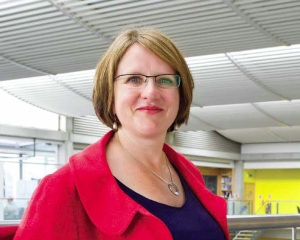
Professor Sara Rankin, Senior Wellcome Investigator
“In my case, I decided to do science at university because I had the opportunity to visit a professional laboratory whilst I was at school,” says Sara.“Neither of my parents went to university, so that was quite an eye opener for me. For that reason alone I would always want to do some sort of outreach, but now I’m in a position to do things with greater impact.
“I think the problem with a lot of outreach activities is that they are a one off thing – what schools want is something in place they can come back to. That’s what this is about.”
It’s nice to see students really excited by what you do
– Dr Jennie Hutton
What makes Reaching Further special is the commitment and creativity of early career researchers (ECRs) who devise hands-on experiences for pupils at various key stages that can also be used by teachers as a learning resource. ECRs can also partner with newly qualified and early career teachers to increase their confidence in delivering research-led practicals and topics.
Dr Jennie Hutton (Chemistry) is a postdoc who decided to get involved in Reaching Further and designed a workshop about drug discovery.
In the workshop she talks about the different ways to combat malaria and how drug resistance means scientists must develop new therapeutics. She goes on to discuss her own research looking at ways of blocking an enzyme in the malarial parasite. The pupils then do an enzymatic jigsaw puzzle and practical lab experiment using enzyme reagents.
“I try to get across to them that this is work that no one else outside of our group is doing,” says Jennie. “It’s nice to see students really excited by what you do and it reinvigorates your own opinions that what you do is genuinely exciting.”
Reaching Further is now run by Exscitec working with Imperial Outreach and supported by grants from RCUK and the Mayors London Schools for excellence funds – both led by Lord Winston, Professor of Science and Society.
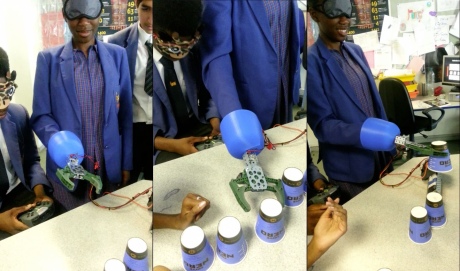
As part of Reaching Further postgrad Shamim Quadir devised a robotics demo about prosthetic limbs which was trialled at a London school
Initially the Reaching Further programme will form links with five secondary satellite ‘hub’ schools. The idea is that those hub schools can then cascade STEM activities to their wider group of affiliated primary and secondary schools.
This model forms a central element of the London Schools Excellence Fund programme of which Imperial is a beneficiary. Ultimately it aims to bring STEM experiences and knowledge to around 250 schools and teachers and approximately 33,000 students across London Boroughs.
A real taste of research
While Reaching Further is providing strong STEM foundations across different age groups and diverse backgrounds, another new initiative will challenge those pupils who want to take science and engineering to the next level.
The CREST awards are run by the British Science Association and encourage pupils to plan and execute long-term science projects with guidance from a professional scientist.There are bronze, silver and gold awards up for grabs – and Sara Rankin likens them to the Duke of Edinburgh’s Awards where pupils plan their own expeditions.
Sara and Dr Leo Carlin (NHLI) have now established an Imperial CREST academy and enlisted a group of early career postdoctoral researchers at the College to help pupils with potential projects.
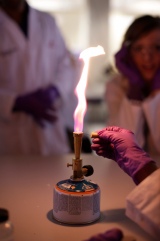 In January this year, 15 postdocs who showed an interest in the scheme were brought together with 35 pupils, aged 16 and 17 years, from two schools. The postdocs gave 5 minute presentations about themselves and their work. They then mingled with pupils, who were encouraged to brainstorm and discuss possible project ideas.
In January this year, 15 postdocs who showed an interest in the scheme were brought together with 35 pupils, aged 16 and 17 years, from two schools. The postdocs gave 5 minute presentations about themselves and their work. They then mingled with pupils, who were encouraged to brainstorm and discuss possible project ideas.
Among the group of postdocs was Dr Ali Salehi-Reyhani (Chemistry) – a physicist by training who has now switched to investigating cancer.
“There were some boys who came up to me at the end and told me that they wanted to build a particle accelerator. I said, ‘well ok then, you need to get down to a scrap yard because you’ll need magnets and if your parents have got an old washing machine lying around that will be useful too’. Their enthusiasm was just brilliant.”
There were some boys who told me that they wanted to build a particle accelerator
– Dr Ali Salehi-Reyhani
Pupils are now in the process of putting together a formal project brief and will be matched with Imperial postdoc mentors who will meet with pupils over the next six months to make their project a reality. They will then hopefully be able to claim a silver CREST award and be eligible for an attempt at gold the following year, with the possibility of applying for £3000 worth of funding for each project from the Royal Society.
“That would be a huge boost. There’s a lot you can do with 3K,” says Ali. “And most importantly they get a feel of what it’s like to be a real scientist – you apply for money, collaborate, and learn something new. That will help them down the line.”
It’s not all a one way street in terms of benefit either – Sara is very keen to emphasise how important such schemes can be for scientists’ careers. “These are absolutely critical transferable skills.
Once you’ve mastered how to communicate to GCSE and A-level pupils, you can communicate to anyone – be it policy makers in parliament, charities, grant holders and VIPs.”
Ali takes this further and suggests his own research might conceivably benefit from the blue skies thinking of the younger generation.
“They are more creative than we are. I really believe that. They’re certainly less encumbered; all they have is their enthusiasm to guide them. And I’m hoping that will be infectious.”
Please contact Professor Sara Rankin or Dr Leo Carlin if you are a postdoc or PhD interested in getting involved in any of these schemes. s.rankin@imperial.ac.uk; l.carlin@imperial.ac.uk
Article text (excluding photos or graphics) © Imperial College London.
Photos and graphics subject to third party copyright used with permission or © Imperial College London.
Reporter
Andrew Czyzewski
Communications Division